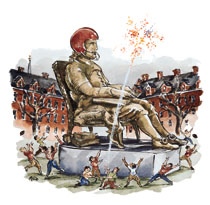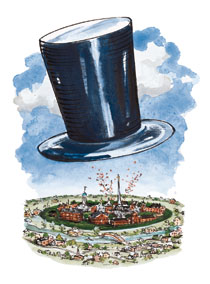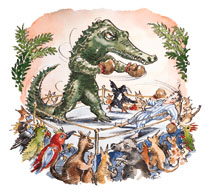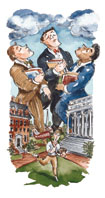
Introduction
100th Anniversary Issue
Centennial Harvests:
The College Pump
The Readers Write
The Undergraduate
Harvard Portrait
Bulletin Boards
Boom and Bust: 1919-1936
War and Peace: 1937-1953
Baby Boom to Bust: 1953-1971
Century's End: 1971-1998
Centennial Sentiments
Harvard Magazine
Troubled Times
(In 1935, Massachusetts enacted a Teachers' Oath Bill, requiring teachers to take an oath affirming the constitutions of the United States and of the Commonwealth. In an editorial, the Bulletin assailed such measures as "an attack not only on the American tradition of free discussion, but also on the university principle of intellectual liberty." President Conant declined to have Harvard lead a challenge to the law, and expressed the hope that all members of the faculties would take the oath.)
You ridicule the suggestion "that all teachers (and in many cases, students as well) shall take oaths of allegiance to the State and Federal Constitutions." Why should a loyal citizen object so to do? An innocent witness does not hesitate to waive immunity. Every office-holder must take an oath, from the President to a member of a petty jury.
Several colleges are today being criticized that professors are teaching communism and socialism. Are they merely giving the history of such beliefs, or are they espousing such doctrines as desirable? We have a right to know.

You infer that an objectionable teacher would take the oath as a necessity without belief. Several years ago, "Veritas" was omitted for a time from the Harvard seal--but it should be present in the Harvard heart.
Thomas W. Slocum '90
Former Harvard Overseer
New York City
April 12, 1935
It is easy to sympathize with the reluctance of a university president to see his university made the center of an obscene clown show, but it is less easy to understand his apparent failure to see that the issue can no longer be evaded unless the clowns are to be allowed to deprive civilized men of every right naturally distasteful to clowns. Dr. Conant said that Harvard must submit to the law....
Surely this is an unnecessarily generous blank check for the traditional defender of free teaching to give to the Fascist reaction. Dr. Conant, by dunking his promising defense in a tub of tepid water, has dimmed one more of the few remaining hopes for the survival of freedom in America.
Frederick Nelson '16
October 25, 1935
(Such debates erupted anew when controversial faculty appointments were made. This letter captures the tone of disaffection among some alumni as the New Deal gave way to World War II.)
One result of the New Deal policies has been to hammer down interest rates and to reduce dividends on stocks due to continued business baiting and wasteful government spending. Every privately endowed educational institution like Harvard knows only too well how seriously this has affected its revenues and realizes how ruinous these government policies may be to such institutions, if continued. In view of this fact, it is difficult to understand how Harvard can go on nourishing vipers in her bosom in the shape of Faculty members who are virtual Fifth Columnists. Certainly there are members of the Faculty who are self-avowed or self-evident left-wingers who advocate the very government policies which will destroy Harvard....In view of these facts and the perilous world situation resulting from the translating into action of the Communist-Nazi-Fascist ideology, is it not time to bring some common sense to bear on the legend of "academic liberalism" and intellectual freedom? Why not root out the Faculty exponents of state socialism who are contributing not only to the overthrow of the American System but also to the ruin of Harvard and other privately endowed educational institutions?
Stanley F. Morse, B.A.S. '06
Sumter, S.C.
October 19, 1940
Sporting Life
Before the curtain is finally rung down on the recent football season, I would like to pay a sincere tribute to the marvelous spirit which has been very apparent throughout the entire fall. At every game there has been more whole-hearted and spontaneous enthusiasm and pep than during any season that I can recall....
Furthermore, the mass meetings held in the Varsity Club Quadrangle on the evenings before several of the games, preceded by the parade with the Band through the Yard and among the Houses...proved beyond any doubt how solidly the student body was behind this team. The singing and cheering on these occasions was immense. It has been a long time since such meetings as these have been held at Cambridge and such an outpouring of real spirit and enthusiasm has been shown. If this is the so-called "rah-rah stuff," then I'm frankly for it one hundred percent....
Richard C. Floyd '11
Brookline, Mass.
December 13, 1941
Under the present football rules it seems legal for an institution with many stalwart students to divide its football team into two divisions, eleven men and substitutes for offense, and another eleven men and substitutes for defense....The practice does not tend to develop all-round football players, but yields to the present-day trend toward "specialists."
Few colleges can maintain a force of two divisions, sharply distinguished, for the football campaign; and few attempt it with the open frankness of the Army. It seems equivalent to pitting two teams against one in a single game.
Is it really a sporting proposition?
William Reed Bigelow '89, LL.B. '92
Natick, Mass.
November 20, 1948
Professing

Last year four men refused appointments in the psychological section of the Philosophy Department of Harvard almost entirely because of the too heavy teaching burden and too little laboratory facilities.
...Every teacher in a college ought to have, so far as possible, the sort of tools he needs, including laboratories, and not too great a teaching load....One man, primarily a teacher, should probably devote all his time to teaching. Such a man's inspiration comes to him as he speaks. Another's greatest service is research, another's writing, another's to commune with the universe. One does his best work lying on a mountain in the sun, another perhaps when he is shaving. I do not mean that the University should supply mountains and shaving materials, but that every teacher should have the time and opportunity not only to do his work but to seek the sources of his strength, and should even when necessary be forced to do so. He should have, as far as possible, the amount and sort of teaching that is good for him...just enough to keep him fit.
Joseph Lee '83, A.M.-LL.B. '87, LL.D. '26,
Harvard Overseer
Boston
June 11, 1931
Harvard college has been the biggest disappointment of my life. It cannot hold a candle to the state university....The administration does not seem to care one iota whether a man can teach--or even if he wants to teach. It seemed to me that the only criterion for Faculty appointment was that of publication, plus, of course, the doctorate degree....
To this, many reply that Harvard College does not believe in spoon-feeding, but that the student should dig the material out for himself. By this criterion the International Correspondence School, not Harvard, is the place to secure an education....
Hamilton T. Brown '48
March 12, 1949
(From the April 9 issue, two responses to Brown's assault on the "malodorous classroom debacle.")
It is unquestionably true, as most college professors say, that learning is the individual student's responsibility. Learning can only happen within the individual mind, by individual effort. But many professors make that an excuse, instead of a challenge. Far more than they imagine, it is their duty to make the student want to learn.
He has struck an important and painful nail on the head when he complains of what may be called, roughly, teacher indifference. This is real.
Richard D. MacCann
Tutor, Department of Government
If Harvard or any other university is to be simply a super high school, then it will require only men who can impart the knowledge they have obtained from others. If it is to be a true institution of learning, this is not enough. It must have, in addition to teachers, men who are constantly increasing their knowledge of the subject of which they are already experts.
Leverett Saltonstall '14, LL.B. '17
United States Senate
President, Board of Overseers, and Chairman, Committee to Visit Harvard College
The Home Front
Having sympathized many times... with the silk hat brigade at Commencement, I am moved by the most recent occasion, the hottest in my memory, to inquire if there is not humanity and ingenuity enough in the Corporation, the Overseers, the Alumni Association, or whoever is arbiter in such matters, to devise a suitable costume for the men who assist the Chief Marshal at these ceremonies? If not, then higher education, as exemplified at Harvard, is a failure.
The problem of protecting the platform guests from sunstroke is mechanical, presumably an awning....Never again should the Degree-holders, the Corporation, the Faculty, and other occupants of the platform be all but roasted alive.
The problem of the Aides is more difficult because purely social. Even so, has not somebody in authority guts enough to decree the banishment of the topper and cutaway which, allowing for certain factors, is hardly less absurd than the bearskin hats before Buckingham Palace?
Lawrence G. Brooks '02, A.M. '03, LL.B. '05
Boston
September 23, 1944
The Pacific Theater
A good-sized crocodile put me out of action...on February 26, as you know. I am not proud of letting him get to me. He did it as I was crossing a deep, sluggish, open creek in a big swamp only 150 yards from the main road. The trail I was following crossed the creek on a small sunken log. I was half way over when the croc came gliding up fast, with only the top of his head out of water. I tried to turn back to the bank but slipped and fell into the creek over my depth, and came up facing the beast a little to the right of his head, about two feet away. I got him by the nose and chin and tried to hold his mouth shut, but he twisted loose instantly, opened wide, and slashed at me, and got me by both hands as I pushed his jaws away from my face. He rolled under me with one tremendously powerful surge and then, although he had me in the bag, he let go and disappeared....
This hospital is beautifully located at the edge of a tremendous forest which sweeps continuously into the interior mountains....Of course the place swarms with cockatoos and parrots and pigeons. Mammals, except for wallabies and wild pigs, are not much in evidence, and reptiles and frogs seem rather few, or perhaps are inconspicuous. Insects just swarm.
I have done little collecting. Other duties have been too numerous. However, I have got 175 species of Carabidae [ground beetles]....The museum has had only about a dozen species from New Guinea up to now. The hospital authorities have winked while I have worked over, in pajamas and part of the time in my coat, every bit of interesting country within three miles. Next November I hope to get leave for a trip to the high Owen Stanleys, to collect everything I can catch without shooting. But this is only a hope.
Philip J. Darlington '26, Ph.D. '31
Captain, MC, AUS
Fall Curator of Coleoptera
New Guinea
July 22, 1944
Women Absent and Present

The Harvard Law School is the only law school in the United States that excludes women. Yet women are people--they vote; they are admitted to the Bar, practise law and become judges; they are members of State legislatures, and of the House of Representatives. The Senior Senator of Arkansas is a woman. Women have been our ministers to Denmark and Norway. A woman has sat in the Cabinet for nine years. Why should they be denied the privilege of preparing for legal, judicial, legislative, diplomatic, executive, and administrative work at the Harvard Law School, the oldest, the most famous, and perhaps the best school in the United States?
Charles C. Burlingham '79
New York City
June 20, 1942
On visiting the Yard recently for the first time in many months I was struck, and violently, by the number of young women parading beneath the elms. Is the Yard no longer a masculine retreat? Am I to understand, sir, that I have become through the attrition of time an alumnus of a coeducational college?
John C. Robbins Jr. '42
Cleveland
February 22, 1947
The Higher Learning
I noted a barred owl last february on Alumni Day on part of the Yale campus. He was headed east, and the one now at Harvard is undoubtedly the same, taking a post-graduate course.
Philip T. Coolidge '05,
Bangor, Me.
February 12, 1949
Buchenwald
One German town in particular i shall never forget: that is Weimar, for years the home of Goethe, cultural capital of Germany and the birthplace of the Weimar Republic. When I saw it, it was fragrant with apple blossoms and birds were singing in every tree. But, in the future, when I think of Weimar, I shall not remember Goethe or apple blossoms. I shall remember only the concentration camp at Buchenwald, just outside the city. Here some 50,000 political prisoners and slave laborers were interned; here they were starved, beaten, tortured, and murdered....
I went to Buchenwald and learned for myself what kind of monsters we are dealing with....I saw bodies piled five feet high, awaiting cremation, bodies so wasted from hunger and disease that their limbs were like sticks. I saw other wasted bodies which had not died yet, but which were dying. I saw the crematory where the victims were burned; the ovens were crammed with charred skulls and an occasional only partly burned corpse. I saw the slaughter house, where men were hung on hooks like sides of beef and then clubbed to death by SS men; you could actually see where their nails had clawed the wall in an ecstasy of fear and agony....
The Germans fill me with loathing and horror which I shall never be able to overcome....
Chris G. Petrow '40
1st Lieutenant AUS
May 26, 1945
(The editors noted that Petrow's maternal grandparents had emigrated from Germany 70 years earlier.)
Matters Architectural
(A suggestion on the siting of the undergraduate library, which had been donated by Thomas W. Lamont '92, LL.D. '31; another letter expressed the hope that the design would look "less like a Howard Johnson establishment than the Houghton Library.")
May I add my protest to the proposed destruction of the Palmer House in the Yard? Must this last vestige of colonial architecture yield to more brick and masonry? If more library space is needed--God knows there is too much library already in the Yard--tear down Boylston, Weld, or Matthews Halls, but leave Professor Palmer's House intact.
Henry M. Fuller '36
Portsmouth, N.H.
April 13, 1946
The Curse of Intellectualism
I have felt for some time that it is possible and altogether desirable to have a normal yet intelligent undergraduate body. A college suffers as much from hot-house intellectualism as it does from mediocre Joe Collegism. It is no secret that if Harvard has veered in either direction in the past few decades, it has been towards the former.
Neither extreme can or should be excluded, perhaps, but it is disturbing to a man of varied interests to be thrown with associates who predominate markedly in one direction or the other....I got this impression as an undergraduate: In the eyes of the administration, the man who renounces Widener for the football field, glee club, and an occasional beer party, while using his study time as best he can to get a C in History I, is less worthy than the fellow who sweats it out all day until 2 a.m., and who gets a B or A....
One way to break the spell of Harvard's reputation for snobbishness and intellectualism might be to award scholarships on something more than an intelligence quota, an idea which I know would be repugnant to various officials of the University. But one cannot interest an undergraduate body in "athletics for all" or outside interests for all when that undergraduate body is composed of a really large groups of students who can think
of nothing but their own intellectual achievements.
David Baldwin '44
April 10, 1948
Matters Memorial

(As after World War I, the appropriate way to remember Harvard war dead, and whom to include, became contentious issues. Among the proposals, in addition to an inscription in the Memorial Church, were suggestions for a student activities center, and programs dedicated to peace.)
s the most suitable memorial to commemorate the Harvard dead of the second World War, I suggest that the Committee approach the problem through the door opened by the Gettysburg Address.
If the memorial is to take tangible form, I suggest that it be in a form which will be useful in the preservation and development of a nation "conceived in Liberty, and dedicated to the proposition that all men are created equal" and to the development of international understanding leading to the achievement of "a just and lasting peace among ourselves and with all nations."
If the memorial can be at least in part an endowment to support a living contribution to international understanding, I suggest that it provide for the financing of substantial memorial scholarships for Harvard students abroad and for foreign students at Harvard.
Harold H. Burton, LL.B. '12
Supreme Court of the United States
April 29, 1947
The recently deceased war memorial argument...left unmade some important observations on general alumni problems....
An official survey of undergraduate opinion bears out my own observation of a lack of sentiment for the plaque in the College; and I further note that 4,000-odd alumni voted by post card recently against immediate acceptance of the plaque plan and fewer than 300 for it.
In spite of these evidences of opposition to the plaque memorial, we find that in the past several months every alumni committee involved in the choice of the Memorial voted for the plaque idea unanimously....I conclude--for lack of an alternative--that our alumni committees are not representative.
It seems to me that the Bulletin itself has a stake in all this. It was particularly disappointing to me to find the Bulletin so irresolute about the proposal for an alumni ballot on the memorial. As I understand it, the Bulletin first suggested the idea of a ballot. Yet it failed to support the suggestion afterwards in a forthright manner. At the risk of sounding like an old-school agitator, I must suggest that this may have been because the editors were afraid of stepping on some influential graduates' toes.
Because the Bulletin is the only regular medium of communication to all the University's alumni, it has a special responsibility to stand up for the rights of all those alumni. It must assume the editorial burden--even at the risk of treading on toes--of making certain that the representative character of official alumni institutions is maintained.
J. Anthony Lewis '48
New York City
January 15, 1949